Are you looking for Etsy alternatives to sell your handmade or unique products? While Etsy is a popular platform, many sellers explore other options due to high fees or limited customization.
Luckily, there are several other platforms that provide different features and pricing structures, catering to the needs of small business owners and independent creators.
From WooCommerce and Shopify to niche marketplaces like Zibbet and Amazon Handmade, these Etsy alternatives offer more control over your online store and can help grow your business.
Why Look For An Etsy Alternative?
Etsy, once a beloved platform for sellers, has faced criticism due to its strict policies and frequent rule changes, leaving many popular vendors disappointed and disconnected.
One of the recent changes that stirred controversy is Etsy’s decision to implement an “offsite ads” model. Under this new system, vendors must pay mandatory advertising fees of up to 15% per customer click on external websites like Google, Pinterest, and Instagram.
Alongside these hefty fees and radical transformations, Etsy has become a target of frustration online, leading to a surge in the search for viable alternatives.
For dissatisfied sellers seeking a new home or aspiring entrepreneurs looking for a more favorable business environment, exploring some of the top Etsy alternatives might be wise.
Top 9 Etsy Alternatives – In A Nutshell
Here are some alternatives that you can try in place of Etsy.
| Sr.No. | Etsy Alternative | Ratings |
| 1 | WooCommerce | 4.7 |
| 2 | Wix | 4.8 |
| 3 | Shopify | 4.9 |
| 4 | Bonanza | 4.5 |
| 5 | Amazon Handmade | 4.8 |
| 6 | Magento (Adobe Commerce) | 4.7 |
| 7 | Weebly | 4.6 |
| 8 | Storenvy | 4.5 |
| 9 | Squarespace | 4.7 |
1. WooCommerce
WooCommerce is a popular WordPress plugin that allows you to create a customizable online store. As an open-source eCommerce solution, it provides great flexibility and integration with WordPress. WooCommerce is free to use, with access to many free and paid extensions that add advanced features.

With WooCommerce, you maintain complete ownership and control over your online store and products. You can list unlimited products, access powerful marketing tools, and design your storefront to match your brand. Transaction fees are also lower compared to Etsy. However, setting up a self-hosted store requires more technical skill and maintenance.
Also Read: Explore the differences between WooCommerce and Shopify through this detailed comparison.
Key Features:
- Free to use and easily integrates with WordPress
- User-friendly dashboard with a setup wizard
- Extensive library of customizable themes
- Intuitive management dashboard
- There is a short learning curve for those familiar with the platform.
Drawbacks:
- It may require some technical skills for advanced customization
- Limited support resources
Pricing: Free (Additional cost required for set up, theme, hosting, etc.)
2. Wix
Wix is a user-friendly drag-and-drop website builder. Using their eCommerce platform, you can easily create a professional-looking online store tailored to your brand with minimal effort. Wix offers hundreds of stylish templates along with customization options and built-in SEO.

With Wix, you can add products, customize checkout pages, and start accepting payments. It also provides promotion tools like coupons to boost sales. Paid plans provide additional features like abandoned cart recovery. However, transaction fees are higher than competitors. However, for beginners, Wix is a top choice for launching an online store quickly and affordably.
Key Features:
- Fully customizable websites with a range of templates
- Flexible payment processing and shipping options
- Range of marketing and SEO tools to promote your store
- Drag-and-drop page editor
- User-friendly dashboard with helpful tools for managing your store
Drawbacks:
- Monthly fees can be expensive for small businesses
- Limited support resources
Pricing: $17/month
3. Shopify
Shopify is arguably the most popular and developer-friendly eCommerce solution. It offers an easy-to-use interface and abundant features to customize your online shop. Shopify also has an app store with thousands of third-party integrations. Plus, it handles security and speed optimization automatically.
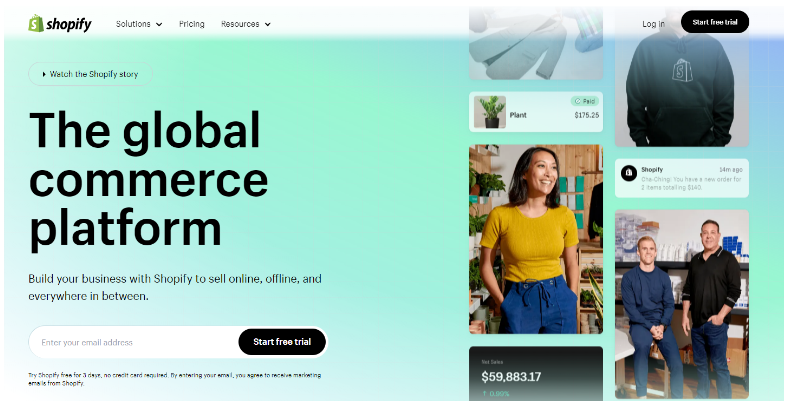
While Shopify requires a monthly subscription, it can still be more affordable than Etsy fees in many cases. You also get a free custom domain name and the ability to sell in person with Shopify POS. Shopify suits sellers who want robust tools and scalability. But the platform fees and add-ons can add up quickly.
Bonus: If you want more data about Shopify, Check out our post-Shopify Statistics here.
Key Features:
- Wide range of unique e-commerce tools for sellers
- Access to payment processors and inventory management features
- Drag-and-drop page editor
- Unlimited storage and bandwidth capabilities
- Compatible with numerous third-party applications
Drawbacks:
- Monthly fees can be expensive for small businesses
- Additional transaction fees for third-party payment providers
Pricing: $39/month
4. Bonanza
Bonanza is a smaller, U.S.-based online marketplace launching in 2008. The platform is focused on handmade, vintage, and artisan goods, making it ideal for former Etsy sellers. Bonanza provides free tools to customize your shop design and product listings.
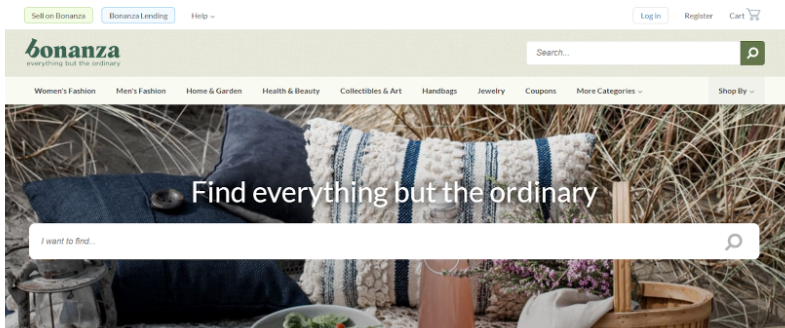
Compared to Etsy, Bonanza charges lower commissions and no recurring fees. The platform also drives external traffic to seller shops. However, Bonanza has fewer shoppers than larger marketplaces. But for low fees and maintaining creative control, Bonanza is worth considering. The basic fee is 3.5% of the final sale price, and there is an additional 1.5% fee for using their advertising program.
Key Features:
- Integration with multiple sales channels like eBay, Amazon, and Google Shopping
- A user-friendly interface that makes it easy to create and manage listings
- Access to powerful selling tools like TurboTraffic and Bonanza Advertising
- A large and active community of buyers and sellers
- Relatively low selling fees compared to other online marketplaces
Drawbacks:
- Overall traffic and sales volume are lower than in other marketplaces
- Advertising programs can be expensive, and sellers may not see a return on their investment
Pricing: Free
5. Amazon Handmade
Amazon Handmade is an in-built platform launched by Amazon in 2015. It is an artisan-only platform that offers a variety of handmade products, including jewelry, home decor, clothing, and accessories. While not as craft-focused as Etsy, Amazon Handmade provides incredible exposure by tapping into Amazon’s built-in audience. Listing products are free, and sellers pay 12% referral fees on each sale.
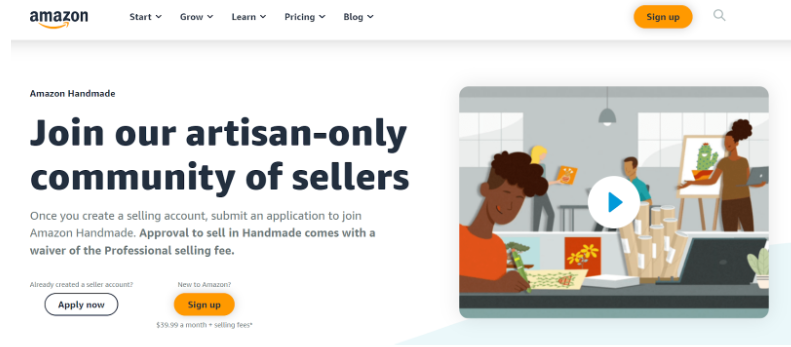
By becoming an Amazon seller, you can leverage features like Fulfillment by Amazon for order processing and Prime eligibility for faster shipping. This makes scaling easier. However, sellers have less control over brand experience on Amazon. Amazon Handmade’s reach can significantly boost sales if you don’t mind giving up some creative autonomy.
Bonus: Discover essential information about Amazon. Check our post on Amazon Statistics here.
Key Features:
- Large customer base and opportunities for growth
- Unique opportunity for artisans to showcase their products
- Detailed information about product production and materials used
- Wide range of handmade products
- Built-in platform with strict guidelines for quality control
Drawbacks:
- Strict guidelines may limit the types of products sold
- High competition from other artisans
Pricing: $39.99/month (monthly fees will be waived once approved)
6. Magento (Adobe Commerce)
Adobe Commerce, formerly Magento Open Source, offers developers an open-source eCommerce platform for complete control and flexibility. You can fully customize your online store’s look, features, and functionality. However, this requires strong technical skills.
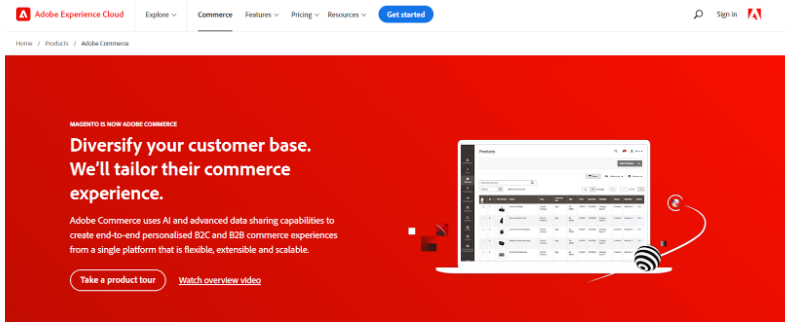
Adobe Commerce is self-hosted, so you maintain data ownership and avoid recurring fees. Paid extensions are available for added functionality. The platform easily scales from small to enterprise-level stores. However, the learning curve is steep for non-developers. For advanced merchants, the potent capabilities of Adobe Commerce make it a top open-source alternative.
Key Features:
- Free, open-source option with valuable features for sellers
- Cloud hosting and customer support
- Special page builder for small businesses
- Multiple formats for different needs
- Wide range of customization options
Drawbacks:
- It may require advanced coding skills for enterprise versions
- A steep learning curve for beginners
Pricing: Custom
7. Weebly
Weebly offers an easy-to-use drag-and-drop site builder for creating an online store. Choose a template, add products, and publish your shop using their eCommerce platform. Weebly offers free themes and integrates with shipping carriers for label printing and tracking.
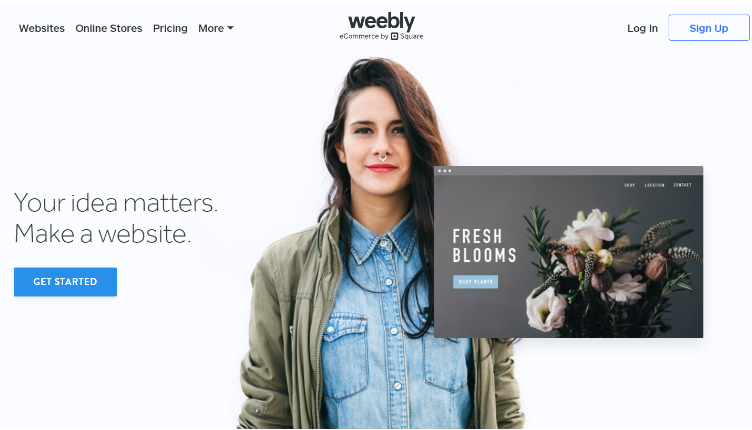
Compared to Etsy, Weebly has no listing fees and a low 3% transaction fee on purchases. You can also embed your online store directly into an existing website. However, you have less control over design and SEO. Weebly is a solid pick for quickly launching a basic online shop on a budget.
Key Features:
- Wide range of features for e-commerce businesses
- User-friendly interface and customizable storefronts
- Range of pricing plans to suit different business needs
- Marketing and SEO tools to promote your store
- Integration with social media platforms like Facebook and Twitter
Drawbacks:
- Limited payment processing and shipping options
- Limited customization options compared to other alternatives
Pricing: $13/month (Free plan available)
8. Storenvy
Storenvy combines social shopping with an online marketplace connecting buyers to seller-designed shop fronts. The platform is geared towards indie brands and makers, offering a curated feel similar to Etsy. Storenvy provides beautiful store templates you can customize and marketing tools to drive sales.
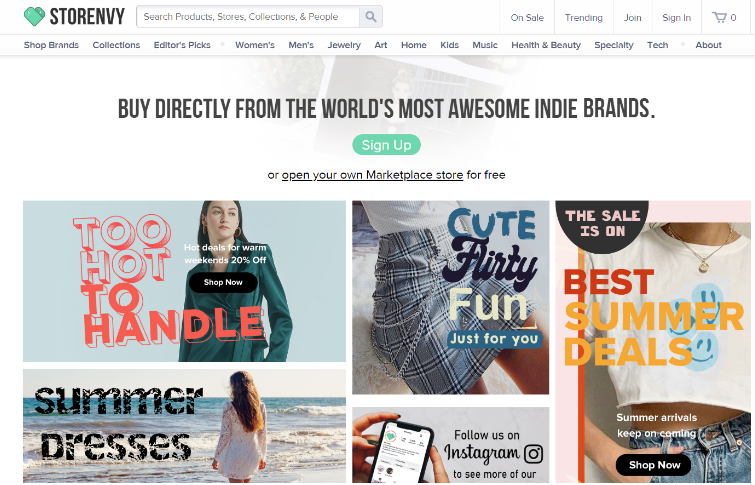
In addition to bringing external traffic, Storenvy handles payments and shipping logistics for sellers. Compared to Etsy, they charge lower monthly fees and 8% transaction fees. However, you have less control over your brand presence by listing products within their marketplace. But Storenvy makes selling simple for crafters and makers.
Key Features:
- A unique e-commerce platform that allows for selling on your website or through the Storenvy marketplace
- Integration with social media platforms
- Range of pricing plans, including a free plan that allows up to 500 products
- Marketing and SEO tools to promote your store
- A large and active community of buyers and sellers
Drawbacks:
- Limited support resources
- Limited customization options compared to other alternatives
Pricing: Free
9. Squarespace
Although not exclusively for handmade goods, Squarespace allows you to create sleek online stores with their all-in-one web platform. Using Squarespace Commerce, you can easily sell physical, digital, or donation-based products online. Their award-winning templates ensure your shop looks stunning.
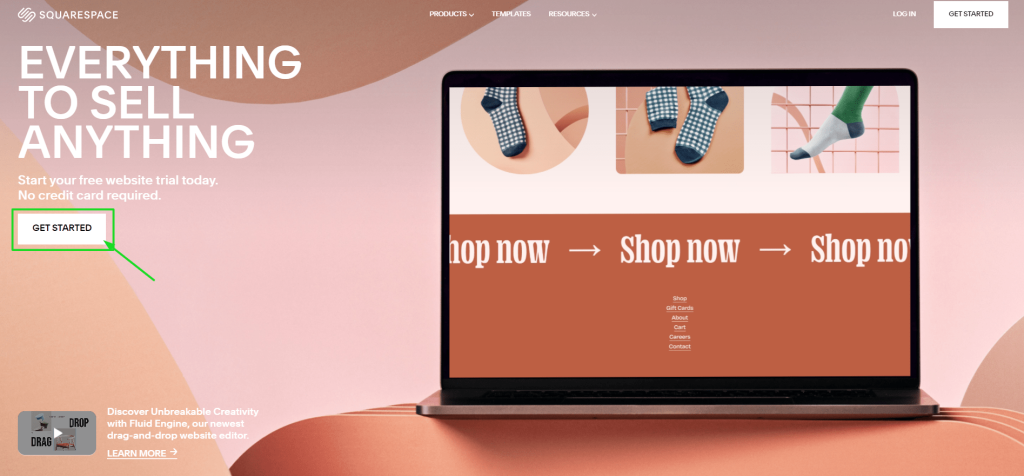
Squarespace charges a monthly subscription to access advanced eCommerce features like automated tax calculations and abandoned cart recovery. But their fees are very reasonable, and they provide a free custom domain. With top-notch design, seamless checkout, and built-in marketing tools, Squarespace empowers creative entrepreneurs.
Key Features:
- Fully customizable websites with a range of templates
- Flexible payment processing and shipping options
- Range of marketing and SEO tools to promote your store
- User-friendly interface and customizable storefronts
- Integration with social media platforms
Drawbacks:
- Monthly fees can be expensive for small businesses
- Limited support resources compared to other alternatives
Pricing: $25/month
More Alternative Artciles:
Conclusion: Shopify & WooCommerce Are The Best Etsy Alternatives
While Etsy paved the way for handmade eCommerce, high fees and saturated competition have motivated many sellers to seek alternative marketplaces and platforms to sell their unique products online. The options we covered allow makers and artists to open and customize their online shops for maximum branding and profits.
For affordability, control, and efficient sales, independent creators should consider alternatives like WooCommerce, Shopify, Bonanza, Storenvy, and Squarespace. Your chosen platform depends on your budget, technical skills, customization needs, and built-in audience size. But with so many excellent options, you can find the perfect eCommerce solution tailored to your handmade business goals and strengths.
FAQs
Etsy charges a USD 0.20 listing fee per item, a 5% transaction fee, payment processing fees of around 3-4%, and additional advertising fees for promoted listings. There are no monthly subscription fees.
For beginners with no technical skills, Wix, Squarespace, Weebly, and Storenvy are the most user-friendly options for launching an online store quickly.
WooCommerce, Shopify, and Adobe Commerce allow the greatest flexibility to customize designs, features, and functionality. But they require stronger technical expertise.
Bonanza has the lowest commission fees at just 3.5%. Weebly is another budget-friendly option with a 2.9% (plus $0.30) transaction fee.
- Shopify 3 Months For $1 (DEC 2025) – 90 Days Trial - October 3, 2025
- Helium 10 Free Trial (2025) — Access Premium Features - September 4, 2025
- Jungle Scout Free Trial (2025) — Get 7 Days Access Now - September 4, 2025

